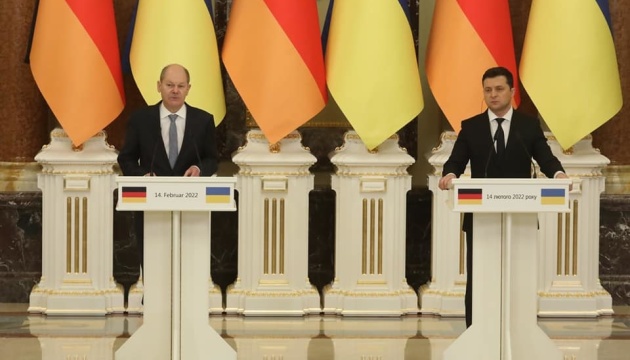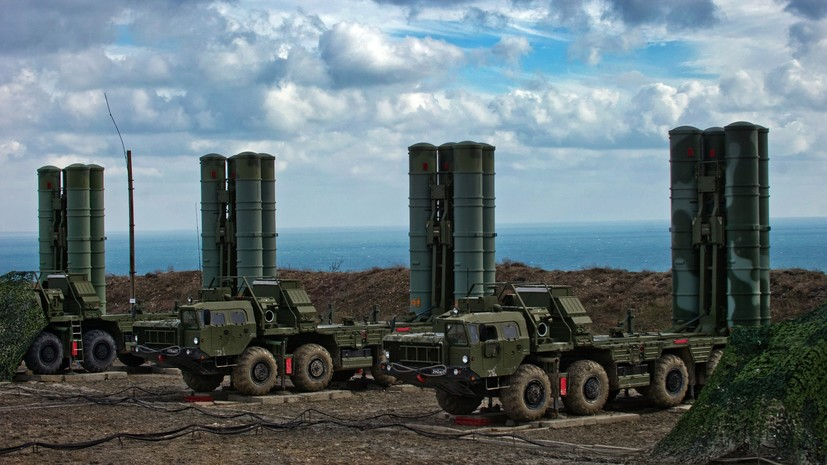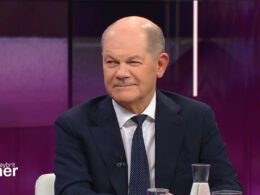Speaking at a press conference after talks with President Zelenskyy in Kyiv on 14 February, German Chancellor Olaf Scholz reiterated that Germany will not arm Ukraine, yet warned of “political and economic” consequences for Russia in case of further military aggression. Scholz also ducked journalists’ questions about Nord Stream 2, the gas pipeline that is set to start delivering Russian gas to Germany, bypassing the route through Ukraine.
“You know Germany’s attitude towards arms exports,” Scholz said, referring to the German government’s restrictive arms export policy widely cited as the reason for not supplying arms to Ukraine. This policy, however, makes an exception for the right of countries for self-defense, which is the case with Ukraine.
The German Chancellor added that Germany had provided a lot of financial assistance to Ukraine. According to him, Germany is “the largest financial donor for Ukraine”:
“No country in the world has supported Ukraine financially as much in the last eight years. In this way, we have made the Ukrainian economy more stable and independent of foreign influence. And we can assure you that we will continue to support this,” Scholz said.
During the conference, Scholz managed to duck twice questions on sanctions on the North Stream 2 in case of a new Russian attack. Meanwhile, President Zelenskyy stated that he and the German Chancellor have “some differences in views” over Nord Stream 2:
“Our position has not changed, today we are considering Nord Stream 2 exclusively through the prism of energy and security threats to us and the region. We clearly understand that this is a geopolitical weapon. That is why Ukraine requires guarantees,” Zelenskyy said.
Germany has avoided stating whether Nord Stream 2 will be shut down in case of a Russian invasion of Ukraine, but during a recent visit to the USA, he confirmed to Republican Senators that he backs US President Biden’s position on Nord Stream 2.
Additionally, Scholz said he considers direct talks between Kyiv and Moscow necessary
“Our common goal is to avoid escalation. To do this, we work at all levels very intensively, closely and with trust. Direct talks with Kyiv and Moscow are very important. We are ready for a serious dialogue with Russia on European security. NATO and the United States have provided Russia with concrete proposals, which we support, and we now expect Russia to respond in response,” he said.
Separately, he assured that France and Germany are trying to find a diplomatic solution to the “difficult situation” and therefore intensified their efforts in the Normandy format.
He also told that Ukrainian President Zelenskyy “assured him that Ukraine would provide draft bills on the special status and local elections [of the Russian-occupied territories in Donbas] for discussion [in the Normandy format].” Scholz called such bills “necessary” to unlock effective talks with the Russian Federation.
Ahead of Scholz’s visit, activists held a picket where they called upon Scholz to refrain from pressuring Ukraine to implement the Minsk agreements, controversial documents signed in 2015 that seek to regulate the Russian-Ukrainian war on conditions Ukrainian critics say are beneficial to the Kremlin. The bills Scholz mentioned are part of the Minsk agreements.
Demands to sanction Putin’s German agents of influence as Chancellor Scholtz visits Ukraine
Germany against shipping arms to Ukraine
Germany has stirred controversy in the latest months by declining to ship defensive arms to Ukraine amid warnings of US intelligence of an imminent Russian invasion. As the US, Britain, and Baltic states have delivered defensive weapons, Germany has promised to send a field hospital and 5 thousand military helmets.
The Ukrainian embassy in Germany had appealed to the German government to ship arms. According to Süddeutsche Zeitung, Ukraine is asking for medium-range anti-aircraft missile systems, portable surface-to-air missiles, anti-drone weapons, electronic surveillance systems, as well as night vision devices, surveillance cameras, ammunition, and more.
In January, Germany blocked North Atlantic Treaty Organization ally Estonia from giving military support to Ukraine by refusing to issue permits for German-origin weapons to be exported to Kyiv as it braces for a potential Russian invasion. As well, earlier, in November 2021, Berlin vetoed Ukraine’s purchase of anti-drone rifles and anti-sniper systems through a NATO procurement agency from Lithuania.
Ahead of Chancellor Scholz’s visit to Ukraine, a debate had been ongoing in Germany about changing the government’s stance on non-supply of weapons to Ukraine. While the possibility of supply has been ruled out in the past, government officials recently said it is being considered.
Defense Ministry spokesperson Arne Collatz also confirmed that the Bundeswehr had received a letter from the Ukrainian side last week regarding assistance, “which is definitely being considered.”
Related:
- Demands to sanction Putin’s German agents of influence as Chancellor Scholtz visits Ukraine
- How Siemens chose to ignore the obvious. An investigation into the Crimean sanctions break
- Gas, money laundering, and pizza: report details Russia’s economic meddling in Europe
- NGO Institute for Security Policy, Austrian Ministry of Defense, and Valdai-Club: Case study on Russian influence in Central Europe
- Germany exports dual-use products to Russia despite EU sanctions, beefing up its military
- “Germany bears a special responsibility for European security”: Ukrainian Jews appeal to Chancellor Olaf Scholz
- Why does Germany refuse to export arms to Ukraine?
- 73 East Europe experts call on Germany to “fundamentally correct” Russia policy






